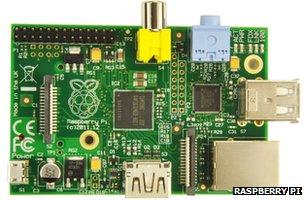Students spend summer on Raspberry Pi and talking web
- Published
Zoe Kleinman visits interns at the Extreme Blue residential camp
As summer holidays go, it hasn't exactly been a conventional vacation for one group of British university students.
Split into teams, they swapped the traditional undergraduate pastimes of bar work and beaches for 12 weeks of intensive research and development in the opulent surroundings of Hursley House in Hampshire, home of IBM's R&D labs.
The groups have been hard at work building answers to problems identified by the computer giant's own technology experts - including a "spoken web" service for the blind and a new children's games platform for the palm-sized low-budget computer the Raspberry Pi.
Net speak
"Chattyweb" is an intelligent voice-recognition platform which can interpret spoken questions and guide the user to specific websites as required.
For example, saying "take me to the BBC News website" does just that, and once there Chattyweb answers questions such as "what is the top story?" or commands like "search for technology news" by reading aloud the relevant text on the page.

Chattyweb allows visually impaired people to use the internet by giving their computer verbal commands
It was designed for and tested by blind people but has other possible applications too, said Abbie Oliver, one of the four students on the Chattyweb development team.
"It could be used in satellite navigation, when you're driving or even baking - it could just be an earpiece and a microphone, you could browse the web whilst you're doing anything," she said.
It is difficult not to draw comparisons with Apple's iPhone assistant, Siri.
"Siri has a confined database... it's good at looking for a definite answer," said Ms Oliver.
"But this is going to the whole net and lifting text. It's good for browsing as it's non-confined."
Pi play
Another team got hold of some of the very first Raspberry Pi computers after the device launched in late February 2012.
They used them to build Raspberry FishPi, a gaming platform aimed at eight to 12 year olds.

The Raspberry Pi is a credit card-sized computer
"The benefit of the Raspberry Pi is that it's very portable - if someone gives you an SD card with games on it you can come home and play it on your TV, your parents can see it, your friends can see it," said the team's mentor Luke Staddon from IBM.
"I hope it will get kids coding again."
The FishPi is a sequence of games which users play. At each level they are shown how to adapt the experience by editing the code behind the game - to slow things down for example, or change a colour.
The game itself suggests some changes and points out to its users where the relevant section of code is.
During user-testing the FishPi team found that their young charges were quick to make more changes to the coding than were suggested by the platform itself.
"Some of them changed the appearance of the character, or made the ship move instead of the hat - it was fun for them to make that little change and then see it happen," said student Thomas Rogers.
"We found that children are interested in coding if you give them the opportunity to do it," said his team mate Gareth Latty.
"They liked the idea that what they did affected the game."
The team is now in talks with E-skills, the government's sector skills council for business and IT, about getting the Raspberry FishPi into schools.

The simple games require basic code changes
Trainee tech
Both teams were taking part in Extreme Blue, a residential summer internship run worldwide by IBM that is now in its eleventh year and has so far been responsible for over 400 patent disclosures and 60 open source donations.
This year UK project manager Ed Moffatt received 900 applications for the 16 places available at Hursley House, the only British location for the course.
"It's great for the UK as a source of tech innovation," he said.
"Generally the calibre of applicants we receive (for the internship) is very high."
With their projects complete, it is now nearly time for the students to go their separate ways.
But first they are itching to do what students are perhaps best known for, and go for a final drink in the salubrious Hursley House clubhouse bar.
Nestling beside the mansion's private cricket ground, it's a luxurious send-off for the exhausted interns.
"It will be good to get back to university," said Matthew Louis-Chang, who is returning to Imperial College London to resume his electrical engineering degree course.
"It's been a great chance to experience an insight into what it's like working in a technology company."
- Published8 March 2012
- Published12 September 2011